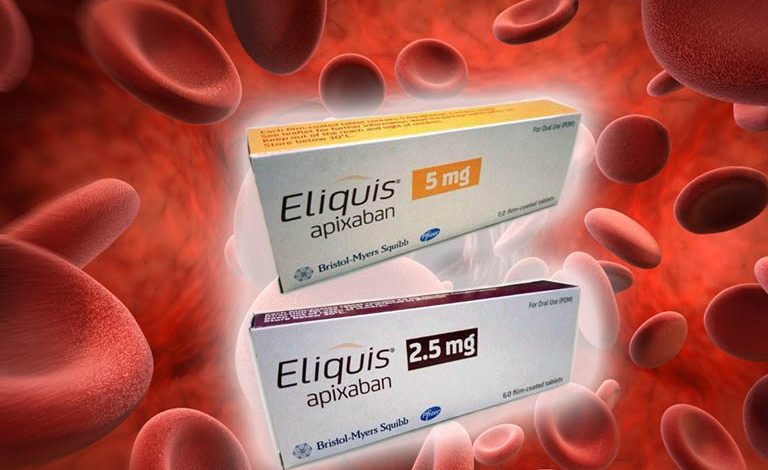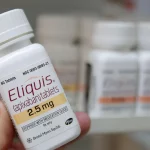The Worst 6 Eliquis Side Effects

Eliquis is a prescription medication used to reduce the risk of stroke and blood clots in people with certain medical conditions, including atrial fibrillation, deep vein thrombosis, and pulmonary embolism. It is also used to prevent blood clots in people who have undergone hip or knee replacement surgery.
Eliquis, also known by its generic name apixaban, was developed by Bristol-Myers Squibb and Pfizer. The drug was first approved by the U.S. Food and Drug Administration (FDA) in 2012 for the prevention of stroke and systemic embolism in people with nonvalvular atrial fibrillation.
In 2014, the FDA approved Eliquis for the treatment of deep vein thrombosis and pulmonary embolism, as well as for the reduction of the risk of recurrent deep vein thrombosis and pulmonary embolism.
Since its approval, Eliquis has become one of the most widely prescribed anticoagulant medications in the world. It is considered a newer-generation oral anticoagulant, which means it has a different mechanism of action than older anticoagulants like warfarin.
Eliquis works by inhibiting the activity of a protein called factor Xa, which is involved in the clotting process. By preventing factor Xa from working properly, Eliquis reduces the risk of blood clots forming.
How Is Eliquis Taken?
Eliquis (apixaban) is a prescription medication that comes in tablet form and is taken orally, typically twice a day with or without food. The dosage and duration of treatment will depend on the condition being treated, the patient’s age, weight, and medical history, as well as other factors.
For atrial fibrillation, the usual dose of Eliquis is 5 mg taken orally twice a day, although some patients may require a lower dose depending on certain factors. For the treatment of deep vein thrombosis or pulmonary embolism, the initial dose is typically 10 mg taken orally twice a day for the first 7 days, followed by 5 mg taken orally twice a day for the remainder of the treatment period.
It’s important to take Eliquis as directed by a healthcare provider and not to change the dose or stop taking the medication without first consulting with a doctor. It’s also important to not miss doses, as this can reduce the effectiveness of the medication.
If a dose is missed, it should be taken as soon as possible on the same day. If it’s already close to the time of the next dose, the missed dose should be skipped and the regular dosing schedule resumed. Patients should not take extra doses to make up for a missed dose.
Eliquis should be stored at room temperature and kept in its original container with the lid tightly closed. Any unused tablets should be properly disposed of according to local regulations.
What Are The Worst Eliquis Side Effects?
While Eliquis is generally considered safe and well-tolerated, there are some serious side effects that can occur with its use. It’s important for patients to be aware of these potential side effects and to contact their healthcare provider if they experience any of the following side effects:
1. Bleeding: Eliquis is an anticoagulant medication that helps prevent blood clots, but it can also increase the risk of bleeding. Symptoms of bleeding may include unexpected or excessive bleeding from cuts or wounds, nosebleeds that do not stop after a few minutes, blood in urine or stool, coughing up blood or blood clots, or severe headaches or dizziness.
2. Allergic reaction: In rare cases, patients taking Eliquis may experience an allergic reaction. Symptoms of an allergic reaction may include difficulty breathing, hives, itching, swelling of the face or throat, or chest pain. Patients who experience these symptoms should seek medical attention immediately.
3. Liver problems: Eliquis can rarely cause liver problems, which may present as yellowing of the skin or eyes, dark urine, or abdominal pain. Patients who experience these symptoms should contact their healthcare provider immediately.
4. Spinal or epidural blood clots: Patients taking Eliquis who undergo spinal or epidural procedures may be at an increased risk of developing a blood clot in the spine or surrounding tissues, which can result in long-term or permanent paralysis. Patients who are scheduled to undergo spinal or epidural procedures while taking Eliquis should inform their healthcare provider.
5. Stroke: While Eliquis is commonly used to prevent stroke in patients with nonvalvular atrial fibrillation, there is a risk of stroke if the medication is abruptly discontinued or if patients do not take it as directed.
6. Other serious bleeding events: In rare cases, Eliquis can cause serious bleeding events, including gastrointestinal bleeding, intracranial bleeding, and bleeding at other sites. Patients who experience signs of bleeding should contact their healthcare provider immediately.
It’s important for patients taking Eliquis to discuss any concerns they have about potential side effects with their healthcare provider and to report any symptoms or signs of bleeding promptly.
Side Effects Of Eliquis In The Elderly
Eliquis is generally safe and well-tolerated, but elderly patients may be more susceptible to certain side effects.
Eliquis-induced bleeding in the elderly can range from mild to severe. Elderly patients are more susceptible to bleeding due to age-related changes in the body, such as thinning of the skin and decreased liver and kidney function. It’s important for elderly patients taking Eliquis to be aware of the signs of bleeding and to report any bleeding episodes promptly to their healthcare provider.
Another potential side effect of Eliquis in the elderly is kidney problems. Eliquis is primarily eliminated from the body through the kidneys, and elderly patients may have decreased kidney function, which can increase the risk of side effects. Elderly patients taking Eliquis may need to be monitored more closely for kidney problems and may require a lower dose of the medication.
Elderly patients taking Eliquis may also be at increased risk of falls and head injuries, which can increase the risk of bleeding. It’s important for elderly patients taking Eliquis to take precautions to prevent falls and to report any falls or head injuries to their healthcare provider.
Other potential side effects of Eliquis in the elderly include gastrointestinal symptoms such as nausea and indigestion, and allergic reactions. It’s important for elderly patients to report any symptoms or side effects to their healthcare provider, as they may require closer monitoring or a change in medication dosing.
What Are The Effective Eliquis Alternatives On The Market?
There are several alternatives to Eliquis (apixaban) that can be used for the prevention of blood clots and the reduction of the risk of stroke in patients with nonvalvular atrial fibrillation, or for the treatment and prevention of deep vein thrombosis and pulmonary embolism. Here are some common alternatives:
Warfarin: Warfarin is a well-established anticoagulant medication that has been used for many years. It works by inhibiting the production of clotting factors in the liver. Warfarin requires frequent monitoring of blood levels and dietary restrictions due to interactions with certain foods and medications.
Dabigatran: Dabigatran is another anticoagulant medication that is similar to Eliquis. It works by inhibiting the production of thrombin, a protein involved in blood clotting. Dabigatran is taken twice daily and requires less frequent monitoring compared to warfarin.
Rivaroxaban: Rivaroxaban is another newer anticoagulant medication that works by inhibiting a clotting factor called factor Xa. It is taken once daily and requires less frequent monitoring compared to warfarin.
Edoxaban: Edoxaban is another anticoagulant medication that works by inhibiting factor Xa. It is taken once daily and has a lower risk of bleeding compared to warfarin.
Aspirin: Aspirin is an antiplatelet medication that works by preventing platelets from clumping together to form a blood clot. It is often used in patients with a lower risk of blood clots, such as those with a history of stroke or heart attack.
It’s important to note that the choice of medication will depend on the individual patient’s medical history, the specific condition being treated, and the potential risks and benefits of each medication. Patients should consult with their healthcare provider to determine the best treatment option for their specific needs.





